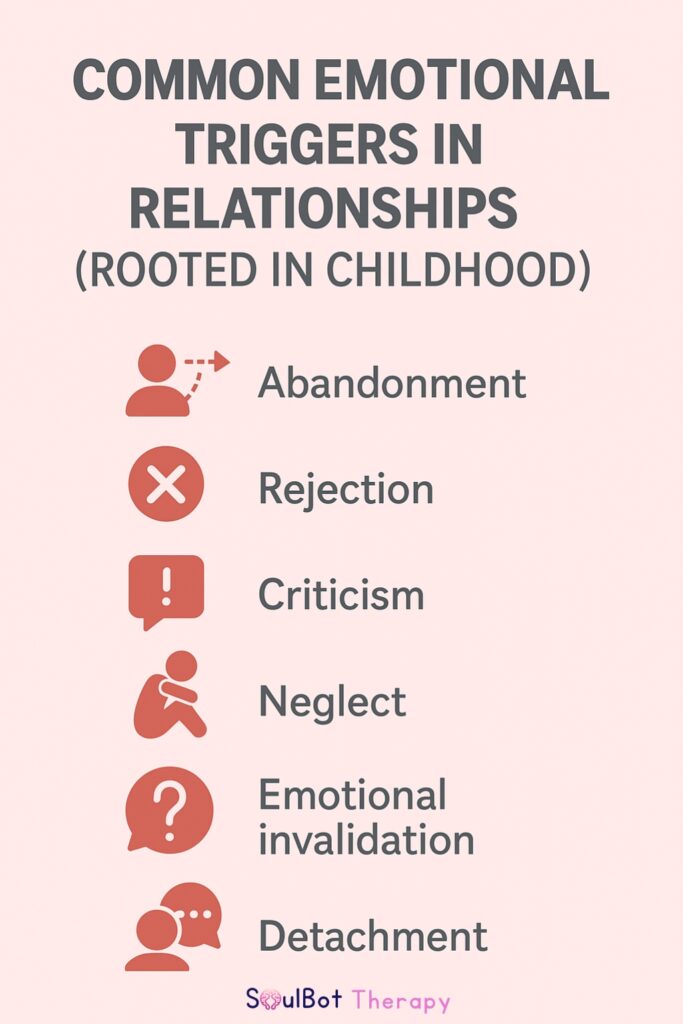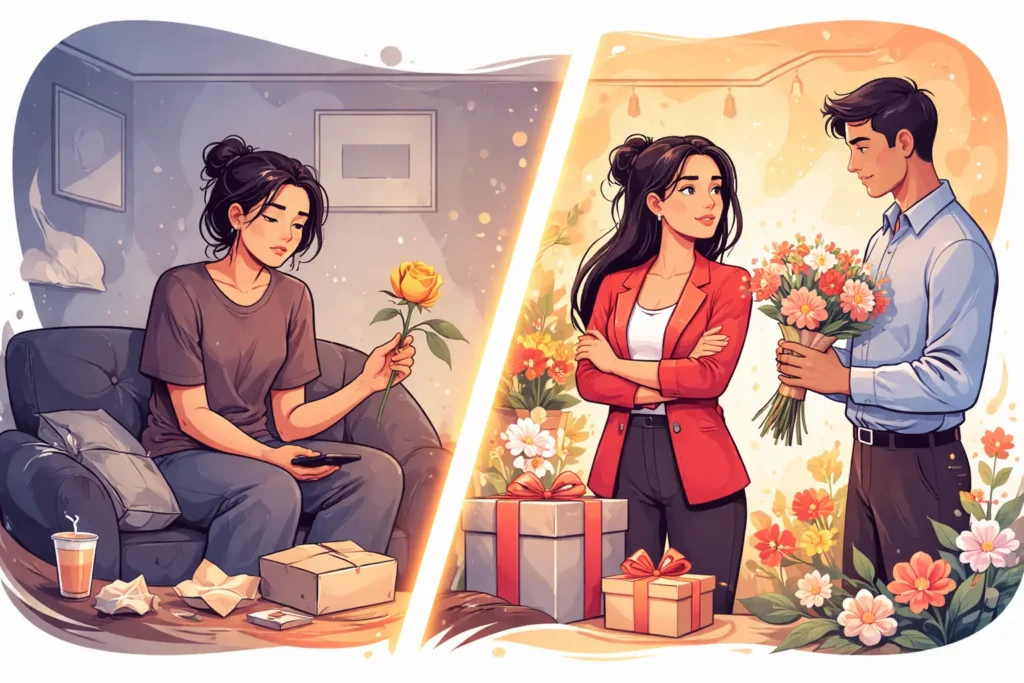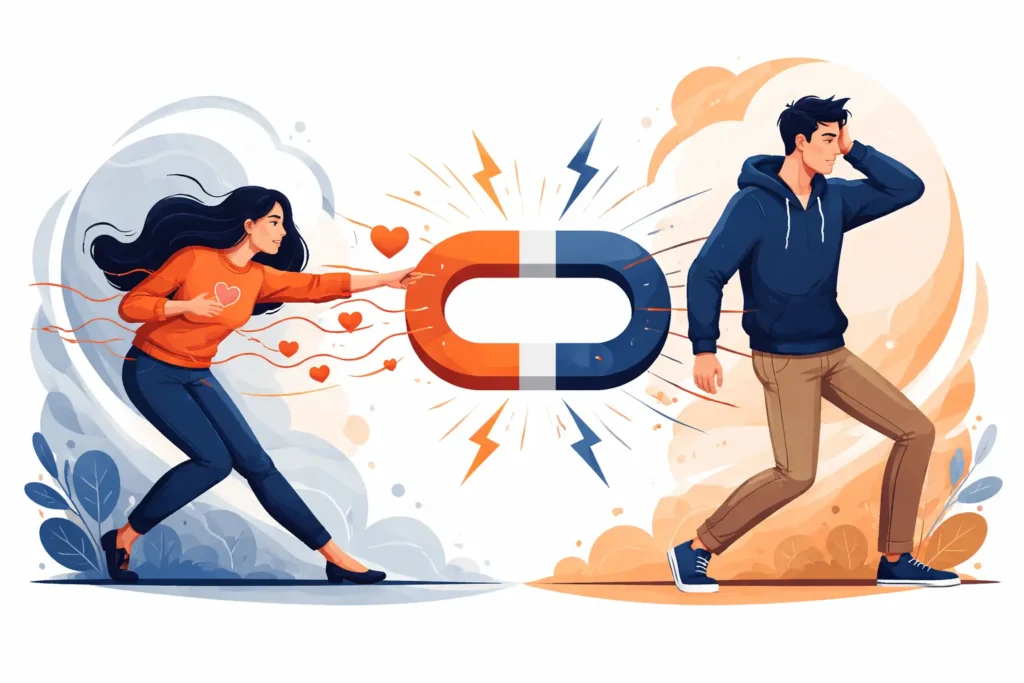Childhood trauma and relationships are deeply connected — often in ways we don’t realise.
- You might overexplain yourself in every argument.
- Feel terrified when someone you love pulls away.
- Or shut down emotionally when things get too close.
The emotional wounds we carry from childhood often shape how we attach, trust, communicate, and cope in love.
Let’s explore how childhood trauma affects adult relationships, what patterns to watch for, and how tools like AI therapy can help you heal with clarity and compassion.
📊 Factual Insight:
According to the National Child Traumatic Stress Network, over 78% of adults in therapy report trauma-based emotional patterns affecting their relationships, including abandonment fear, emotional dysregulation, and trust issues.
How Childhood Trauma Affects Adult Relationships?

Wondering if your past is showing up in your love life? Here are common signs:
- Constant fear of being abandoned
- Over-apologizing, even when it’s not your fault
- Avoiding emotional intimacy or deep conversations
- Feeling anxious when your partner pulls away
- Reacting strongly to small disagreements
- Attracting emotionally unavailable or toxic partners
These aren’t “personality flaws.” They’re trauma responses learned to survive love that didn’t feel safe. These responses don’t disappear with age — they evolve into emotional triggers in relationships. That’s why childhood trauma and relationships are deeply connected — even decades later.
Signs Your Past Is Showing Up in Your Love Life
You might be carrying old wounds if:
- You panic when someone takes “too long” to reply
- You feel guilty when setting boundaries
- You overanalyse silence, facial expressions, or conflict
- You expect others to leave before they’ve even hinted at it
- You feel unworthy of love that’s calm, consistent, or kind
These are not flaws — they’re trauma-informed reactions your body created for protection.
The Psychology Behind Childhood Trauma & Relationships
Trauma bonding is a cycle where intense emotional highs and lows feel like connection, but are actually confusion + fear masquerading as passion.
Unhealed childhood trauma often creates:
- Insecure attachment (anxious, avoidant, or disorganised)
- Repeating toxic patterns — even with different partners
- Loss of emotional boundaries in love
These aren’t relationship issues. Their nervous system imprints are trying to stay safe.
Common Emotional Triggers in Relationships (Rooted in Childhood)
Certain experiences can reactivate old wounds:
| Trigger | Trauma Response |
|---|---|
| Silence or withdrawal | Panic, overthinking, clinginess |
| Criticism | Shame, rage, or emotional shutdown |
| Feeling “not enough” | Overgiving or people-pleasing |
| High affection | Self-sabotage, fear of loss |
| Conflict | Avoidance, freeze, or passive-aggression |
Understanding your emotional triggers in relationships helps you pause, reflect, and respond from the present, not the past.
👉 Talk to SoulBot – Your AI Mental Health Companion
How to Start Healing Childhood Trauma in Relationships?
Healing doesn’t mean forgetting. It means learning new emotional responses. Here’s how to begin:
1. Name the Pattern
Identify repeating behaviors: attracting the same kind of partner, avoiding conflict, shutting down emotionally.
2. Inner Child Work
Write letters to your younger self. Ask: What did I need back then that I didn’t get?
3. Set Boundaries Without Guilt
Healthy boundaries build safety for you and your partner.
4. Use AI Tools for Reflection
Apps like SoulBot help process triggers in real-time without judgment.
How AI Therapy Can Help You Heal Relationship Patterns?
Healing isn’t always accessible. Not everyone has a therapist on speed dial. That’s why tools like SoulBot — your AI mental health companion — matter.
🧠 With SoulBot, you can:
- Journal your triggers and get clarity
- Reflect on patterns like people-pleasing or conflict panic
- Get calming prompts when your nervous system spikes
- Learn how to pause, not spiral
It’s not therapy — it’s a judgment-free emotional mirror to help you notice, name, and soothe your wounds.
You’re Not Too Much — You Were Just Hurt Too Young
- If love feels like survival…
- If peace feels foreign…
- If you push away what you want most…
That’s not brokenness. That’s trauma’s fingerprint. And healing doesn’t mean perfect.
It means safer. Softer. More aware. You don’t have to do it alone.








